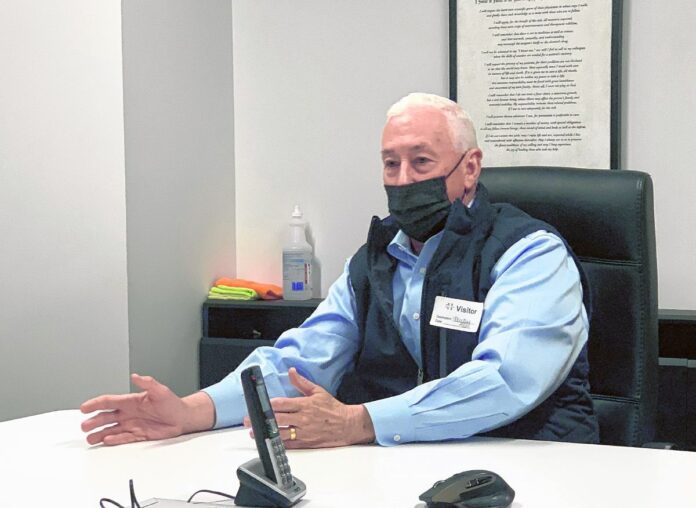
GREENFIELD — U.S. Rep. Greg Pence, R-Indiana, visited Hancock Regional Hospital Tuesday to meet with health care and telecommunications leaders about issues surrounding virtual health care in rural settings.
The significance of telemedicine has grown greatly throughout the COVID-19 pandemic, but challenges remain in getting infrastructure to all who could benefit from it, determining how such health care is paid for and educating patients on how to access it.
Pence made his visit in search of feedback as Congress prepares what he called a “flood of federal dollars” coming for enhancing broadband telecommunications throughout the country.
“What we’re going to champion is — let’s deliver it to rural,” Pence said.
Before the pandemic, Hancock Health was doing about 0.5% of its visits through a virtual connection, said Steve Long, president and CEO. At the height of the pandemic, it was upwards of 80%. Currently, it’s down to just under 10%.
“It is a piece of what we do in the world of medicine now,” Long said.
After Hancock Health staff carried out a simulation using teleconferencing software to demonstrate how telemedicine visits work between health care professionals, patients and family members, Long discussed broadband shortcomings for residents in rural areas the hospital serves, like in and around Knightstown, where it has a clinic.
More work needs to be done on ensuring health care providers get paid for providing telemedicine as well, he continued.
“The rules around payment for telemedicine were relaxed greatly during COVID, and there’s still some concern about whether it will last,” Long said.
Pence said he’s heard from constituents about insurance companies not reimbursing or covering telehealth calls.
Long said Hancock Health has run into that too.
“What we’re finding is insurance companies promised many things during COVID that are beginning to fall away,” he said. “And what we’re also finding is some of the bills that we’re submitting for reimbursement for telemedicine are being denied on a variety of grounds.”
Dr. Michael Fletcher, a physician with Hancock Internal Medicine, said those without access to telehealth services can suffer from a digital divide.
“The way health care is moving and the importance of having electronic communication with your physician’s office is such that the people who do not have that start to have a different level of care,” Fletcher said.
Dr. Julia Compton, CEO of Hancock Physician Network, pointed out how effective telemedicine can be for mental health care.
Michael Burrow, president and CEO of NineStar Connect, a nonprofit cooperative that provides telecommunications and other utilities in Hancock County and the surrounding region, referenced a challenge to funding broadband infrastructure in rural areas. State and federal funds for such expenses are often targeted for achieving broadband speeds too slow for effective telemedicine services, he said.
“When you’re talking two-way video, particularly when sharing images, you need broader bandwidth, quite frankly,” Burrow said.



